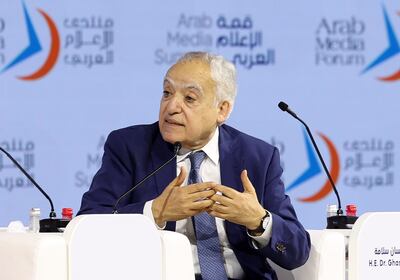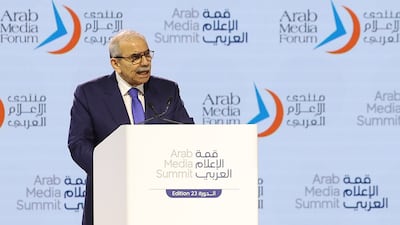Lebanon's Prime Minister on Tuesday said his government is committed to placing rogue weapons under state control and reclaiming its sovereignty, as he called for help to get his country back on its feet.
Nawaf Salam said Lebanon is rising from the rubble of its political, economic and social turmoil, but needs $14 billion to rebuild after the war between Israel and the Iranian-backed militant group Hezbollah.
The small Eastern Mediterranean nation is grappling with a deep-rooted economic crisis that began in 2019 and was exacerbated by the year-long war.
Hezbollah, long described as a “state within a state”, has been severely weakened after Israel killed its leader Hassan Nasrallah, eliminated key commanders, decimated its infrastructure and infiltrated its security apparatus.
Mr Salam, who was president of the International Court of Justice in The Hague until earlier this year, delivered a speech at the Arab Media Summit in Dubai on Tuesday.
“Lebanon, worn down by conflicts, foreign tutelage and internal fragmentation, has decided to reclaim its voice and its state,” he told the audience. “Our path forward is one of reform and sovereignty, where the exclusive authority over arms rests with the state alone.
“This means breaking free from the duality of weapons, which for years created a duality of decision-making and undermined the building of a unified national state.”
New government's vision
Mr Salam outlined the government’s comprehensive vision rooted in the rule of law and institutions.
“Lebanon should not be a proxy battlefield, but rather a state capable of making independent decisions in times of peace and war,” he said.
Despite expressing hope for regional collaboration, the Prime Minister also pointed out continuing challenges to Lebanon's sovereignty.
The appointment of Mr Salam and the election of Joseph Aoun as President have raised hopes among many Lebanese, as both men are seen as a departure from the traditional ruling class that has been blamed for decades of corruption and mismanagement.
President Aoun has repeatedly stated that the decision to centralise all arms under state authority has been made, but emphasised that this can only be achieved through dialogue, not force.
“Lebanon is committed to fully implement UN Security Council Resolution 1701 and to maintain its adherence to a cessation of hostilities. However, we still face occupation and Israeli violations, including daily breaches into Lebanese territory,” he said.
Israel continues to launch near-daily strikes in Lebanon and maintains a military presence along the southern border, despite a ceasefire agreement reached in November
Mr Salam's speech came amid political and economic reforms, as Lebanon attempts to restore stability and credibility on the domestic and international stages.
“Lebanon, deeply rooted in its Arab identity and affiliation [is] open to the world, and capable of acting as a bridge between East and West,” he said.
Billions needed for reconstruction
During a session at the same event, Dr Ghassan Salame, Lebanon's Minister of Culture, said the south, shattered by Israeli bombs, needs up to $14 billion for reconstruction.
“We are serious in our reform plan for the economic and banking sector after the major collapse. Rebuilding south Lebanon needs between $12 billion to $14 billion,” Dr Salame said.
He said the government must extend its control on all territories, including the south, where Hezbollah controlled policing and government functions for years.
“For the first time, we have around 7,300 military personnel in areas they have never been before for 50 years. We want to increase the number to 10,000 personnel,” he said.
“We are serious in our plan, but there are many obstacles such as Israel – still in five occupied points, despite a ceasefire.”
He said they will issue regulations for the reform of the economic and banking sectors, as well as working on security to revive the tourism sector – which he said remains the best source of potential income for Lebanon.
On Syria, also struggling to rebuild after 13 years of civil war, Dr Salame said the recent lifting of US sanctions must have come with conditions.
“Syria is still in the early stages of transformation. There is major change in the nature of Syria authority and its regional allies,” Dr Salame said. “Is there a cost for Syria’s embrace by the West? I think the West doesn’t offer anything for free. The bill may be to push for an understanding with Israel.”
US President Donald Trump unexpectedly announced earlier this month that he would lift the sanctions at the behest of Saudi Arabia's Crown Prince Mohammed bin Salman, in a major US policy shift. Last week, the US Treasury Department announced a general licence for Syria, providing immediate sanctions relief.
Bio:
Favourite Quote: Prophet Mohammad's quotes There is reward for kindness to every living thing and A good man treats women with honour
Favourite Hobby: Serving poor people
Favourite Book: The Alchemist by Paulo Coelho
Favourite food: Fish and vegetables
Favourite place to visit: London
Wicked: For Good
Director: Jon M Chu
Starring: Ariana Grande, Cynthia Erivo, Jonathan Bailey, Jeff Goldblum, Michelle Yeoh, Ethan Slater
Rating: 4/5
Company Profile
Name: Thndr
Started: 2019
Co-founders: Ahmad Hammouda and Seif Amr
Sector: FinTech
Headquarters: Egypt
UAE base: Hub71, Abu Dhabi
Current number of staff: More than 150
Funds raised: $22 million
Name: Colm McLoughlin
Country: Galway, Ireland
Job: Executive vice chairman and chief executive of Dubai Duty Free
Favourite golf course: Dubai Creek Golf and Yacht Club
Favourite part of Dubai: Palm Jumeirah
COMPANY PROFILE
Name: HyperSpace
Started: 2020
Founders: Alexander Heller, Rama Allen and Desi Gonzalez
Based: Dubai, UAE
Sector: Entertainment
Number of staff: 210
Investment raised: $75 million from investors including Galaxy Interactive, Riyadh Season, Sega Ventures and Apis Venture Partners
SPECS
%3Cp%3E%0D%3Cstrong%3EEngine%3A%3C%2Fstrong%3E%204.0-litre%20twin-turbo%20V8%0D%3Cbr%3E%3Cstrong%3EPower%3A%3C%2Fstrong%3E%20750hp%20at%207%2C500rpm%0D%3Cbr%3E%3Cstrong%3ETorque%3A%3C%2Fstrong%3E%20800Nm%20at%205%2C500rpm%0D%3Cbr%3E%3Cstrong%3ETransmission%3A%3C%2Fstrong%3E%207%20Speed%20dual-clutch%20auto%0D%0D%3Cbr%3E%3Cstrong%3ETop%20speed%3A%3C%2Fstrong%3E%20332kph%0D%3Cbr%3E%3Cstrong%3EFuel%20consumption%3A%3C%2Fstrong%3E%2012.2L%2F100km%0D%3Cbr%3E%3Cstrong%3EOn%20sale%3A%20%3C%2Fstrong%3EYear%20end%0D%3Cbr%3E%3Cstrong%3EPrice%3A%3C%2Fstrong%3E%20From%20Dh1%2C430%2C000%20(coupe)%3B%20From%20Dh1%2C566%2C000%20(Spider)%3C%2Fp%3E%0A
COMPANY PROFILE
Name: Kumulus Water
Started: 2021
Founders: Iheb Triki and Mohamed Ali Abid
Based: Tunisia
Sector: Water technology
Number of staff: 22
Investment raised: $4 million
From Zero
Artist: Linkin Park
Label: Warner Records
Number of tracks: 11
Rating: 4/5
Global state-owned investor ranking by size
|
1.
|
United States
|
|
2.
|
China
|
|
3.
|
UAE
|
|
4.
|
Japan
|
|
5
|
Norway
|
|
6.
|
Canada
|
|
7.
|
Singapore
|
|
8.
|
Australia
|
|
9.
|
Saudi Arabia
|
|
10.
|
South Korea
|
Moon Music
Artist: Coldplay
Label: Parlophone/Atlantic
Number of tracks: 10
Rating: 3/5
Plan to boost public schools
A major shake-up of government-run schools was rolled out across the country in 2017. Known as the Emirati School Model, it placed more emphasis on maths and science while also adding practical skills to the curriculum.
It was accompanied by the promise of a Dh5 billion investment, over six years, to pay for state-of-the-art infrastructure improvements.
Aspects of the school model will be extended to international private schools, the education minister has previously suggested.
Recent developments have also included the introduction of moral education - which public and private schools both must teach - along with reform of the exams system and tougher teacher licensing requirements.
Getting%20there%20and%20where%20to%20stay
%3Cp%3EEtihad%20Airways%20operates%20seasonal%20flights%20from%20Abu%20Dhabi%20to%20Nice%20C%C3%B4te%20d'Azur%20Airport.%20Services%20depart%20the%20UAE%20on%20Wednesdays%20and%20Sundays%20with%20outbound%20flights%20stopping%20briefly%20in%20Rome%2C%20return%20flights%20are%20non-stop.%20Fares%20start%20from%20Dh3%2C315%2C%20flights%20operate%20until%20September%2018%2C%202022.%C2%A0%3C%2Fp%3E%0A%3Cp%3EThe%20Radisson%20Blu%20Hotel%20Nice%20offers%20a%20western%20location%20right%20on%20Promenade%20des%20Anglais%20with%20rooms%20overlooking%20the%20Bay%20of%20Angels.%20Stays%20are%20priced%20from%20%E2%82%AC101%20(%24114)%2C%20including%20taxes.%3C%2Fp%3E%0A%3Cp%3E%3C%2Fp%3E%0A
THE BIO
Occupation: Specialised chief medical laboratory technologist
Age: 78
Favourite destination: Always Al Ain “Dar Al Zain”
Hobbies: his work - “ the thing which I am most passionate for and which occupied all my time in the morning and evening from 1963 to 2019”
Other hobbies: football
Favorite football club: Al Ain Sports Club
Tips on buying property during a pandemic
Islay Robinson, group chief executive of mortgage broker Enness Global, offers his advice on buying property in today's market.
While many have been quick to call a market collapse, this simply isn’t what we’re seeing on the ground. Many pockets of the global property market, including London and the UAE, continue to be compelling locations to invest in real estate.
While an air of uncertainty remains, the outlook is far better than anyone could have predicted. However, it is still important to consider the wider threat posed by Covid-19 when buying bricks and mortar.
Anything with outside space, gardens and private entrances is a must and these property features will see your investment keep its value should the pandemic drag on. In contrast, flats and particularly high-rise developments are falling in popularity and investors should avoid them at all costs.
Attractive investment property can be hard to find amid strong demand and heightened buyer activity. When you do find one, be prepared to move hard and fast to secure it. If you have your finances in order, this shouldn’t be an issue.
Lenders continue to lend and rates remain at an all-time low, so utilise this. There is no point in tying up cash when you can keep this liquidity to maximise other opportunities.
Keep your head and, as always when investing, take the long-term view. External factors such as coronavirus or Brexit will present challenges in the short-term, but the long-term outlook remains strong.
Finally, keep an eye on your currency. Whenever currency fluctuations favour foreign buyers, you can bet that demand will increase, as they act to secure what is essentially a discounted property.
Skewed figures
In the village of Mevagissey in southwest England the housing stock has doubled in the last century while the number of residents is half the historic high. The village's Neighbourhood Development Plan states that 26% of homes are holiday retreats. Prices are high, averaging around £300,000, £50,000 more than the Cornish average of £250,000. The local average wage is £15,458.
Titanium Escrow profile
Started: December 2016
Founder: Ibrahim Kamalmaz
Based: UAE
Sector: Finance / legal
Size: 3 employees, pre-revenue
Stage: Early stage
Investors: Founder's friends and Family
2.0
Director: S Shankar
Producer: Lyca Productions; presented by Dharma Films
Cast: Rajnikanth, Akshay Kumar, Amy Jackson, Sudhanshu Pandey
Rating: 3.5/5 stars



